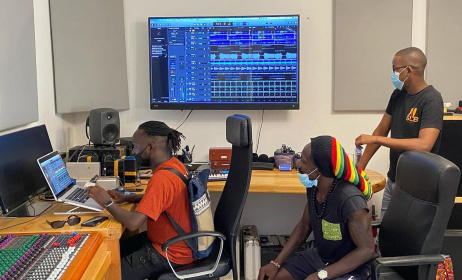New KAMP board members outline vision at Kenyan CMO
New and re-elected directors of the Kenya Association of Music Producers (KAMP) have outlined their vision following voting held in Nairobi on 13 December.
 Suzanne Gachukia has a three-point plan to optimise the collection of royalties at KAMP.
Suzanne Gachukia has a three-point plan to optimise the collection of royalties at KAMP.
Monica Kibayu, Geoffrey Kwatemba and Suzanne Gachukia were elected to the board of directors, while Faith Kithele, Anthony Musembi, Patrick Ndilango and vice-chairperson Angela Ndambuki retained their seats. Anthony Murimi is the collective management organisation’s [CMO’s] outgoing chairperson, with his replacement set to be elected in January.
“We would like to congratulate all the winners for gaining the trust of the members to be elected as board directors,” KAMP said. “In particular, we celebrate the women who have been elected. Best wishes to all as they embark on their new responsibilities.”
Kwatemba, Gachukia and Ndambuki spoke to Music In Africa about what they were hoping to achieve during their tenure as they seek to chart a new path in the Kenyan collective management landscape, which has been plagued by mistrust among players for decades. “For us to realise our potential, there should be mutual understanding between us and the government,” Kwatemba said.
Many will be watching how this pans out given that most CMOs in Kenya seem to be working at cross-purposes with state regulator the Kenya Copyright Board (KECOBO).
“The government, through the regulator, should give us a conducive working environment and review our tariffs to increase collections,” Kwatemba added. “My expectation is that as a team we shall come up with new policies that will help increase our collections so that we can distribute to our members what is commensurate with their work. We would like to be remembered as a board that articulated concerns and created solutions for issues affecting our members.”
Gachukia’s main mission is to re-energise KAMP’s original vision to empower members economically through efficient and transparent leadership.
“I have a simple three-point agenda to ensure that this is done,” she said. “First, we have to get back to basics by ensuring the collection of royalties is done in a fully transparent manner and distributed equitably through a quantitative, scientific method. Secondly, we have to explore emerging markets. It’s not enough to digitise, we must monetise. This means educating members on how to track their streams and downloads. Last but not least is education and empowerment of members to increase earnings and profits that can be reinvested in the music business.”
Ndambuki, who retained her position as KAMP vice-chairperson and is the regional director for sub-Saharan Africa at the International Federation of the Phonographic Industry, is keen to continue advancing rightsholders’ interests.
“Our business as a CMO is not only to collect royalties but also to manage rights and most importantly distribute the correct amount,” she said. “Rightsholders are central to our work, without them there’s no CMO. To achieve their role, CMOs need high-level strategic guidance that is only possible with a competent board.”
Ndambuki said KAMP needed to remodel its systems to increase collections and manage operating costs. She added that the distribution of broadcast revenues ought to be scientific and on a pay-or-play basis in line with global best practices.
“To improve royalty distribution, I will champion the use of the International Standard Recording Code [ISRC] issued by IFPI, outsourcing of a reliable and affordable monitoring and fingerprinting system, and the development of robust data management systems to help in facilitating market intelligence and analytics,” she said.





























Commentaires
s'identifier or register to post comments